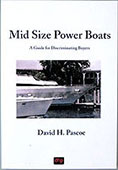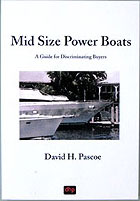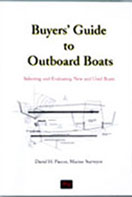After the Survey
Boat Buying 101:
Used Boats
The Issues You Face and How to Deal With Them
by David Pascoe
You've spent months, possibly even years researching the ideal boat you want to buy. You finally reach the big day when you have found it, have made an offer, and it has been accepted. The boat has gone to survey, which is now complete, and the survey report is now in hand. Just one problem: Despite the fact that the boat looked great before you made the offer, the survey didn't quite confirm your expectations.
Your dream boat has some problems. Not the usual run-of-the-mill type, nagging list of this and that, but a serious problem or two that's tending to turn your head in other directions. Perhaps it's an engine situation as discussed in It's Got Overhauls! Or maybe it's a combination of three things that, each taken by themselves is not enough to turn the boat down, yet taken together are more than you want to deal with.
The Right Boat
This is a fairly common dilemma that you should have some answers for before you make that offer. For no matter how good a used boat may look on the surface, the potential for the discovery of some hidden faults runs high. We've seen it happen again and again. The discriminating buyer has made the decision that he wants to buy a used boat that is in first class condition, deciding that he's not going to accept anything less. Moreover, he's willing to travel far and wide to find exactly the right boat.
The problem arises that first one boat, and then another, have gone to survey and have turned out less than anticipated. There are problems, but he doesn't want any problems. Yet he's already got another problem in that he's now spent a good deal of time and money seeking out his perfect boat, but is yet to find it. His costs are piling up and he's getting frustrated. So what's a buyer to do?
Realities
There are several important realities that used boat buyers need to keep in mind in order to keep the problems you may face in their proper perspective. These are as follows:
1. Diferred Maintenance
Boat owners sell their boats for a lot of reasons. Foremost of these is that for one reason or another, they can no longer afford the boat, or to maintain it in the condition in which it should be maintained. Most often, that means that they've simply run out of money. It's now time to sell. This translates to the fact that a very large percentage of used boats for sale are going to have deferred maintenance. That means that no matter how good the boat looks, the buyer should expect that the survey is going to generate a list of problems. If the buyer is not prepared to deal with this reality, then maybe he should be looking at new, rather than used boats.
2. Keeping a cost perspective
That used boat is selling for only a fraction of what the new boat costs. The difference is called depreciation. If the original price was $100,000, but the used price is now $65,000, that's $35,000 worth of depreciation that the buyer is not paying for.
3. Depreciation
Like any vehicle, one can't keep taking out without putting back in. Things that wear out have to be repaired or replaced. This is what depreciation is all about, and why you're not paying a new boat price. Sure that includes things like not getting a warranty, and having a lot of the shine worn off. But it also means things like deferred maintenance that the owner hasn't taken care of.
4. Fitting Out
By now you know that if you purchase a new boat, the price you negotiate for it is not the price you pay. Nor will you be able to just write the check, hop aboard and go. There is that time consuming factor called "fitting out," which includes getting it ready and working out the inevitable bugs that come with most used boats. Even impulse buyers usually end up discovering that there is a big time lag between completing the purchase and having cocktails on the aft deck. Both new and used boats are much the same in this respect.
Before you get going, there's a lot of work to be done and money to be spent.
Certain Inevitabilities
Cutting to the chase here, considering and preparing for certain inevitabilities will ease the way for you.
- Over 90% of all boats sold every year are used boats. There is an extraordinarily good reason for that. The fact is, used boats represent exceptionally good value.
- First, no matter how good it looks, expect problems, expect some disappointment. In return for that good value, there will be these realities you have to deal with.
The most important thing you can do is to realize that an attempt to find a perfect boat, one with no problems, is not likely to be the best avenue of approach. This is the old story of the devil you know versus the one you don't. It is very possible that you could take three very good possibilities to survey and have all three turn out the same. Then where are you? Frustrated and disappointed, right? Never mind a bit poorer for all the money you just spent on your search.
An Example
So let's take a particular example here. Let's say that you've found what looks to be the ideal boat, but the survey turns up a couple of things that you'd really rather not contend with. Say the generator took a dump for some quirky reason, and has to be replaced. And let's say it's got a window leakage problem that is going to cost a substantial amount to resolve. The owner didn't resolve this because he wasn't willing to spend the bucks. He tried to dodge the issue but now it's come back to haunt him. And you.
Assuming that you've already decided that this is the type and model boat for you, the greater problem is the question of whether the next boat you look at isn't going to be much the same. Consider:
- All boats of the same age, make or model are likely to have similar problems.
- Similar types of machinery, equipment and other problems tend to occur at similar times in any boat's life span. Similar to the way mufflers, shocks, brakes, etc., on road vehicles tend to wear out at similar intervals.
Reject the First Boat?
The question boils down to whether reject the first boat and move onto the next? Or should you attempt to resolve the issues by negotiating price and getting them repaired? Consider too, that for the typical diesel cruiser that you've traveled a long distance to purchase, you'll probably end up spending at least $2,000 on survey fees and travel, maybe more. Do this a couple times and the cost gets serious.
The time to consider this is before you make the offer. Think about it and get yourself a general idea of what you're willing to accept. How much more in time, travel, surveys and other expense are you willing to spend looking for a boat with fewer problems. How far would those expenses go toward fixing the problems found on the first boat?
In most cases, dealing with the problems found in the first boat is the right course of action. The exception is when a boat turns out to be a real dog. Unless you are looking at very late model boats, the odds are high that you'll encounter the same thing in the next one you look at. Yes, it's going to take a bit more time and effort. But the inherent advantage in this situation is that you now know what you've got. The repaired things get repaired and you are unlikely to have to face that issue again.
Machinery Problems
This is particularly true when it comes to major machinery problems such as engines and generators. Let's say we've got a 10 year old boat and the survey determines the engines are clapped out. They need overhauls. Is the next 10 year old boat likely to be any different? Okay, let's say the next boat has engines aren't blowing clouds of smoke, but they've got a lot of time on them. Which deal ultimately offers the better security? Buying a boat for which you know the engines have a limited remaining life span, or one in which the engines are already clapped out, but you are able to negotiate the price and get them overhauled?
Smart Way
Sure, it can be hard to see it this way because of the added hassle you have to face up front. The question is, do you want to face that issue now, or put it off into the future? No one wants to buy a boat that needs fixing and then have to face a repair project. The fact is, with a used boat, there is a lot you're not paying for. Something has been taken out that needs to be put back in.
The issue is inevitable. The question is: when do you want to face it and get it out of the way?
The smart way is to deal with it NOW.
Related Article: It's Got Recent Overhauls!
Posted April 14, 2000

















David Pascoe is a second generation marine surveyor in his family who began his surveying career at age 16 as an apprentice in 1965 as the era of wooden boats was drawing to a close.
Certified by the National Association of Marine Surveyors in 1972, he has conducted over 5,000 pre purchase surveys in addition to having conducted hundreds of boating accident investigations, including fires, sinkings, hull failures and machinery failure analysis.
Over forty years of knowledge and experience are brought to bear in following books. David Pascoe is the author of:
In addition to readers in the United States, boaters and boat industry professionals worldwide from nearly 80 countries have purchased David Pascoe's books, since introduction of his first book in 2001.
In 2012, David Pascoe has retired from marine surveying business at age 65.
On November 23rd, 2018, David Pascoe has passed away at age 71.
Biography - Long version